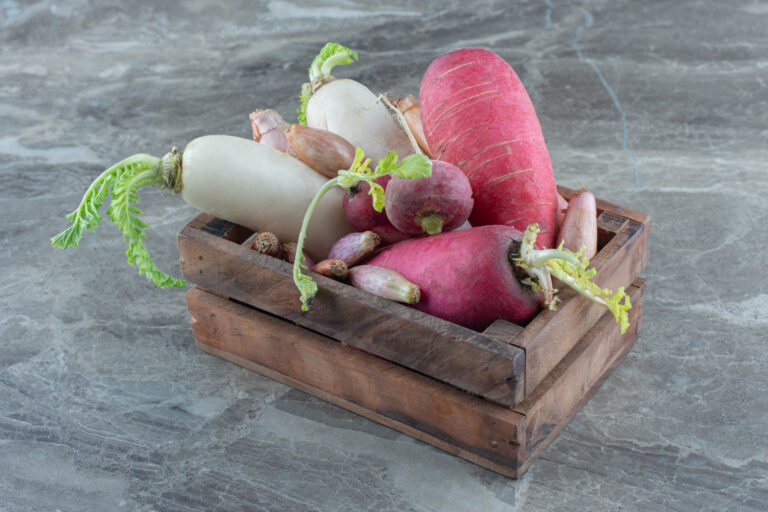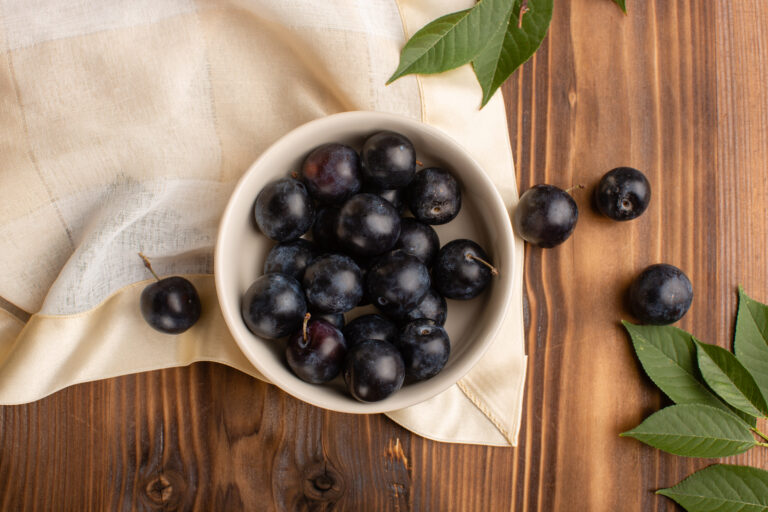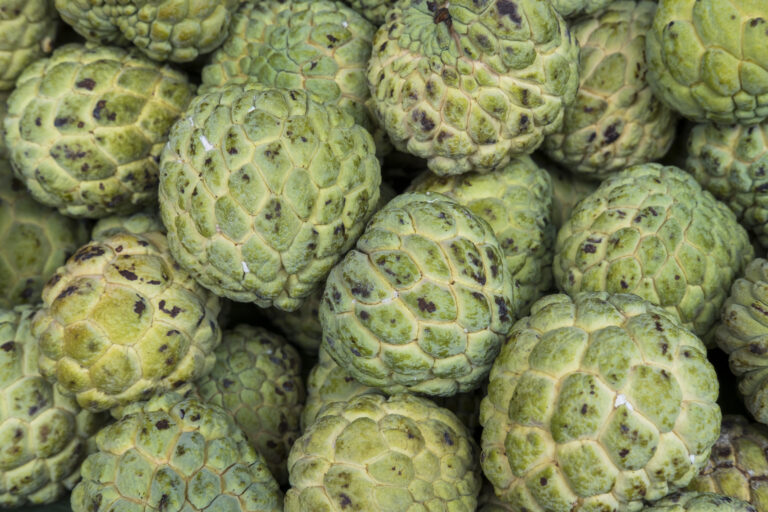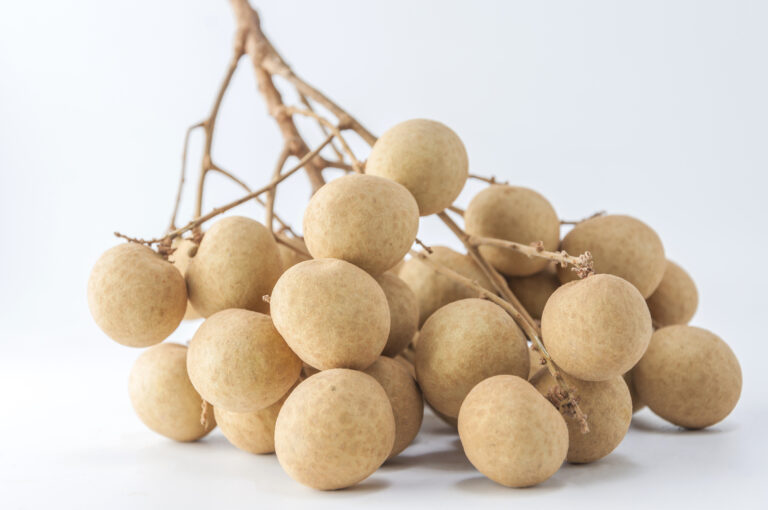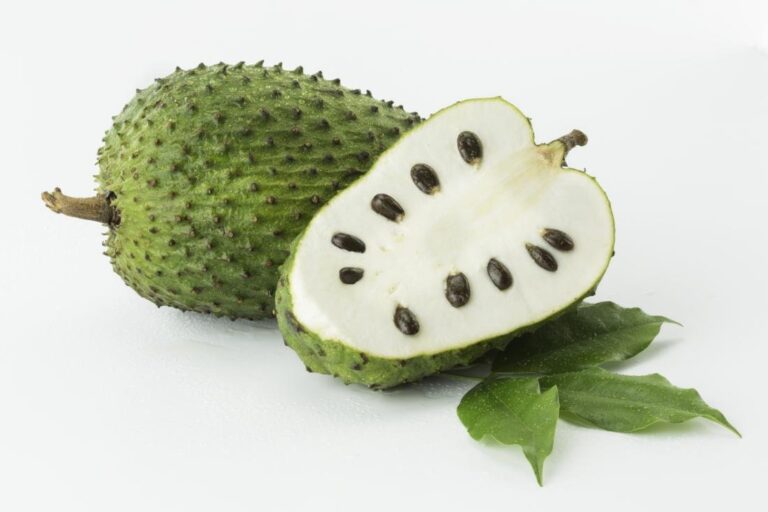Overview
Daikon radish is scientifically known as Raphanus sativus var. longipinnatus. It is a versatile and nutritious root vegetable that is widely cultivated and consumed in various cuisines around the world.
Originating in Southeast Asia, daikon radish has become a staple in many Asian, particularly Japanese, Korean, and Chinese, dishes. The name “daikon” is derived from the Japanese words “dai” (large) and “kon” (root) emphasizing its impressive size and elongated shape.
Daikon radish is characterized by its large, white, cylindrical root, which can grow up to several feet in length.
It has a mild flavor and a crisp, juicy texture, making it a popular addition to salads, pickles, and various cooked dishes.
The flesh is usually white but there are also varieties with green or black skin.

Nutritional Content of Daikon Radish
Daikon radish is a nutritious root vegetable that offers a range of vitamins, minerals, and other beneficial compounds. Here is a breakdown of daikon radish nutritional content per 100 grams:
- Calories: Approximately 18 calories
- Carbohydrates: Around 4 grams
- Dietary Fiber: Provides about 1.6 grams
- Protein: Contains approximately 0.6 grams
- Fat: Very low in fat, with negligible amounts
- Vitamin C: A good source, offering around 27 milligrams
- Folate (Vitamin B9): Provides about 27 micrograms
- Potassium: Contains around 227 milligrams
- Water Content: High, at around 95%
Daikon radish’s nutritional profile makes it a low-calorie, hydrating vegetable with notable amounts of vitamin C, folate, and potassium, making it a healthy addition to various meals.
Types of Daikon Radish
There are several types of daikon radish, each with its own unique characteristics. Some of the common varieties include:
- Japanese Daikon (Raphanus sativus var. longipinnatus): This is one of the most widely recognized varieties. Japanese daikon radishes are large, typically reaching lengths of one to two feet. They have a white skin and crisp, juicy flesh. Japanese daikon is commonly used in Japanese cuisine, including pickles, salads, and as a garnish.
- Korean Mu (Raphanus sativus var. sativus): In Korean cuisine, daikon radish is known as “mu.” Korean mu is similar to Japanese daikon but may have a slightly different shape. It is often used in making kimchi, a traditional Korean fermented vegetable dish. Korean mu can be found in various shapes, including cylindrical and tapered forms.
- Chinese Lobak or Lo Bok (Raphanus sativus var. longipinnatus): Chinese lobak, also known as lo bok, is a type of daikon radish commonly used in Chinese cuisine. It has a mild flavor and is often used in stir-fries, soups, and as a filling for dumplings. Chinese lobak can have both white and green varieties.
- Green Meat Radish (Raphanus sativus var. hortensis): This variety of daikon radish has green skin and a crisp, white interior. It is known for its sweet and mild flavor. Green meat radish is commonly used in salads, pickles, and as a raw snack.
- Black Spanish Radish (Raphanus sativus var. niger): While not as common as white daikon radishes, the black Spanish radish is another type. It has a black or dark brown skin and a white interior. Black Spanish radishes have a more peppery flavor compared to other varieties and are often eaten raw or used in cooking.

These are just a few examples, and within each variety, there can be different cultivars with specific characteristics. The choice of daikon radish can depend on regional preferences, culinary applications, and personal taste preferences.
Healthy Benefits of Daikon Radish
Certainly! Here are five health benefits of daikon radish:
1. Low in Calories, High in Nutrients:
Daikon radish is a nutrient powerhouse that provides essential vitamins and minerals with minimal caloric impact. Its low-calorie content (around 18 calories per 100 grams) makes it an ideal choice for those aiming to maintain a healthy weight.
Despite its low energy density, daikon is rich in vitamin C, an antioxidant vital for immune function, collagen synthesis, and skin health. It also supplies potassium, supporting heart health, and folate, crucial for cell division and DNA synthesis.
2. Digestive Health:
The significant dietary fiber content in daikon radish (approximately 1.6 grams per 100 grams) contributes to digestive well-being. Fiber promotes regular bowel motions, prevents constipation, and maintains a healthy gut environment.
Moreover, a fiber-rich diet is associated with a reduced risk of gastrointestinal issues, such as diverticulitis and irritable bowel syndrome (IBS).
3. Antioxidant Properties:
Daikon radish boasts a spectrum of antioxidants, including vitamin C, flavonoids, and other phytonutrients. These antioxidants neutralize free radicals in the body, helping to mitigate oxidative stress.
By combating cellular damage, daikon radish may contribute to reducing the risk of chronic diseases, including cardiovascular issues and certain cancers.
4. Hydration Support:
With an impressive water content of approximately 95%, it aids in maintaining hydration levels. Optimal hydration is vital for bodily functions such as temperature regulation, nutrient transport, and toxin elimination.
Including water-rich foods like daikon radish can be particularly beneficial, especially in climates or situations that require increased hydration.
5. Anti-Inflammatory Effects:
It contains compounds with anti-inflammatory properties, such as enzymes and certain phytonutrients. Chronic inflammation is linked to a variety of medical disorders, including arthritis and cardiovascular disease.
The anti-inflammatory effects of daikon radish may contribute to mitigating inflammation and promoting overall health.
Outlook
In summary, it stands out as a versatile and nutritionally dense vegetable. Its nuanced combination of vitamins, minerals, fiber, and antioxidants makes it a valuable addition to a balanced diet, offering an array of health benefits that extend beyond basic nutrition. As with any dietary choices, individual needs and health considerations should be taken into account, and consulting with healthcare professionals or nutritionists is recommended for personalized advice.
Also, check out The 7-Day High Protein Meal Plan.

